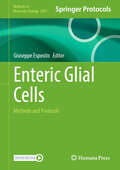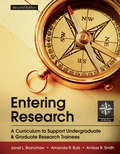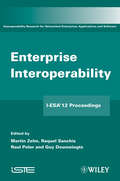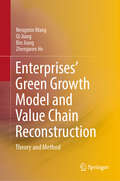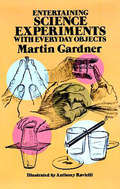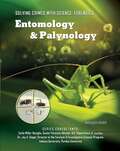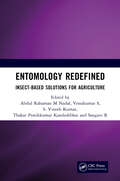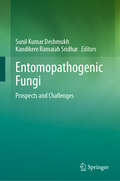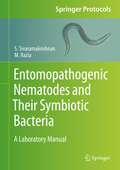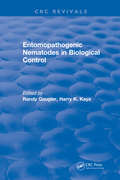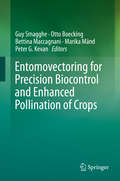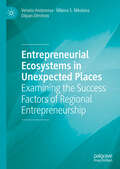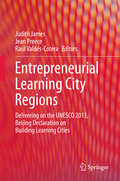- Table View
- List View
Entangled State Representations in Quantum Optics
by Xiang-Guo Meng Ji-Suo Wang Bao-Long LiangThis book highlights the applications of continuous-variable entangled state representations in the research areas of quantum optics via the integration method within an ordered product of operators (IWOP). As a way to develop the Dirac’s symbolic method, the IWOP method has made the integration of non-commutative operators possible by arranging non-commutable operators within an ordered product symbol. It not only deals with many existent quantum optics problems but also explores new research fields. The book also establishes a theoretical framework for solving important quantum optics subjects by taking full advantage of the entangled state representations. With original methods and detailed descriptions, the book is suitable for researchers, instructors, and students interested in quantum mechanics, quantum optics, and quantum information science.
Entangled Worlds: Religion, Science, and New Materialisms (Transdisciplinary Theological Colloquia)
by Catherine Keller and Mary-Jane RubensteinHistorically speaking, theology can be said to operate “materiaphobically.” Protestant Christianity in particular has bestowed upon theology a privilege of the soul over the body and belief over practice, in line with the distinction between a disembodied God and the inanimate world “He” created. Like all other human, social, and natural sciences, religious studies imported these theological dualisms into a purportedly secular modernity, mapping them furthermore onto the distinction between a rational, “enlightened” Europe on the one hand and a variously emotional, “primitive,” and “animist” non-Europe on the other. The “new materialisms” currently coursing through cultural, feminist, political, and queer theories seek to displace human privilege by attending to the agency of matter itself. Far from being passive or inert, they show us that matter acts, creates, destroys, and transforms—and, as such, is more of a process than a thing. Entangled Worlds examines the intersections of religion and new and old materialisms. Calling upon an interdisciplinary throng of scholars in science studies, religious studies, and theology, it assembles a multiplicity of experimental perspectives on materiality: What is matter, how does it materialize, and what sorts of worlds are enacted in its varied entanglements with divinity? While both theology and religious studies have over the past few decades come to prioritize the material contexts and bodily ecologies of more-than-human life, Entangled Worlds sets forth the first multivocal conversation between religious studies, theology, and the body of “the new materialism.” Here disciplines and traditions touch, transgress, and contaminate one another across their several carefully specified contexts. And in the responsiveness of this mutual touching of science, religion, philosophy, and theology, the growing complexity of our entanglements takes on a consistent ethical texture of urgency.
Entanglement Between Noncomplementary Parts of Many-Body Systems
by Hannu Christian WichterichThis thesis investigates the structure and behaviour of entanglement, the purely quantum mechanical part of correlations, in many-body systems, employing both numerical and analytical techniques at the interface of condensed matter theory and quantum information theory. Entanglement can be seen as a precious resource which, for example, enables the noiseless and instant transmission of quantum information, provided the communicating parties share a sufficient "amount" of it. Furthermore, measures of entanglement of a quantum mechanical state are perceived as useful probes of collective properties of many-body systems. For instance, certain measures are capable of detecting and classifying ground-state phases and, particularly, transition (or critical) points separating such phases. Chapters 2 and 3 focus on entanglement in many-body systems and its use as a potential resource for communication protocols. They address the questions of how a substantial amount of entanglement can be established between distant subsystems, and how efficiently this entanglement could be "harvested" by way of measurements. The subsequent chapters 4 and 5 are devoted to universality of entanglement between large collections of particles undergoing a quantum phase transition, where, despite the enormous complexity of these systems, collective properties including entanglement no longer depend crucially on the microscopic details.
Entanglement Measures and Their Properties in Quantum Field Theory (SpringerBriefs in Mathematical Physics #34)
by Stefan Hollands Ko SandersThis book gives a rigorous treatment of entanglement measures in the general context of quantum field theory. It covers a broad range of models and the use of fields allows us to properly take the localization of systems into account. The required mathematical techniques are introduced in a self-contained way.
Entanglement in Spin Chains: From Theory to Quantum Technology Applications (Quantum Science and Technology)
by Abolfazl Bayat Sougato Bose Henrik JohannessonThis book covers recent developments in the understanding, quantification, and exploitation of entanglement in spin chain models from both condensed matter and quantum information perspectives. Spin chain models are at the foundation of condensed matter physics and quantum information technologies and elucidate many fundamental phenomena such as information scrambling, quantum phase transitions, and many-body localization. Moreover, many quantum materials and emerging quantum devices are well described by spin chains. Comprising accessible, self-contained chapters written by leading researchers, this book is essential reading for graduate students and researchers in quantum materials and quantum information. The coverage is comprehensive, from the fundamental entanglement aspects of quantum criticality, non-equilibrium dynamics, classical and quantum simulation of spin chains through to their experimental realizations, and beyond into machine learning applications.
Entanglement: The Greatest Mystery in Physics
by Amir D. AczelWhy packages separated by thousands of miles change together.
Entanglements of the Maya Universe: Life, Society, and Cosmos among the K'iche' of Momostenango (Ethnography, Theory, Experiment)
by Alonso Rodrigo Zamora CoronaCosmology or cosmological ideas are often sought to solve problems in our daily lives. This book aims to rethink the topic of cosmology in anthropology through an ethnographic description of the many entanglements of cosmological ideas and the personal and political lives of individuals within the K’ich’e Maya community of Momostenango, Guatemala. It addresses the question of why they turn to cosmology in an everyday context and how ‘efficient’ it is. It also shows the way Indigenous cosmological ideas are echoed by contemporary philosophical and scientific conceptions.
Entdecke das Riechen wieder: Warum es sich lohnt, die Welt mit der Nase wahrzunehmen
by Andreas KellerWarum es sich lohnt, die Welt mit der Nase wahrzunehmenEntdecke das Riechen wieder riecht wie alle anderen Bücher, aber nachdem Sie es gelesen haben, werden Bücher und vieles andere für Sie nicht mehr so riechen wie zuvor. Ob es bei Menschen Pheromone gibt, warum es so schwierig ist, über Gerüche zu reden, welches Tier den besten Riecher hat und warum manche Menschen den Geruch von Spargel-Urin nicht riechen können - das sind nur einige der Fragen, die der Geruchsforscher Andreas Keller in diesem Buch beantwortet. Menschen besitzen eine gute Nase, haben aber im Laufe der Evolution mehr und mehr verlernt, sie zu benutzen. Dieses Buch wird Sie überzeugen, dass Riechen nicht so mysteriös ist, wie oft angenommen, und dass es sich lohnt, die Welt wieder (auch) mit der Nase wahrzunehmen. In einem Zeitalter, das von digitalisierten Erfahrungen geprägt ist, die beliebig kopiert und für die Ewigkeit gespeichert werden können, bedeutet die flüchtige Realität eines Geruches mehr als je zuvor.
Entdeckt Künstliche Intelligenz außerirdisches Leben?: Wie Maschinen die Suche nach Leben im Universum erleichtern
by Wilfried DomainkoDie Entdeckung von Leben auf anderen Himmelskörpern würde nahelegen, dass es mehrere Wege zur Entstehung und Entwicklung von komplexen Wesen gibt und würde damit unsere Sicht auf das Universum dramatisch verändern. Entsprechend gibt es derzeit eine Vielzahl an astrobiologischen Forschungsprogrammen. Diese Untersuchungen werden entweder vor Ort auf Himmelskörpern in unserem Sonnensystem oder mittels Fernerkundung mit spezialisierten Teleskopen auf Planeten in anderen Sternsystemen durchgeführt. Ferner können durch das Studium von extremen Lebensräumen auf der Erde Rückschlüsse auf mögliche extraterrestrische Habitate gezogen werden. In diesem Buch werden verschiedenen Ansätzen bei der Suche nach außerirdischem Leben vorgestellt. Eine Künstliche Intelligenz kann für diese Fahndung vorteilhaft eingesetzt werden. Sie durchforstet Daten und kann dabei kleinste Hinweise auf die Aktivitäten von Leben finden. Des Weiteren kann sie bei vor-Ort-Untersuchungen in unserem Sonnensystem selbstfahrende Rover, autonome Drohnen und selbst-navigierende U-Boote steuern. Daher werden in diesem Buch die vielfältigen Anwendungsmöglichkeiten von künstlicher Intelligenz bei der Lebenssuche aufgezeigt. Die große Zahl an Forschungsprogrammen in diesem Bereich hat zu einer komplexen Informationslage geführt. Intelligente Dialogsysteme, welche einen substantiellen Teil des Wissens der Menschheit analysieren, werden daher mittlerweile zur Informationsbeschaffung und Informationszusammenführung eingesetzt. Mit Hilfe dieser Künstlichen Intelligenzen generierte Blickwinkel auf Fragen der Lebenssuche auf anderen Himmelskörpern werden in diesem Buch ebenfalls diskutiert.
Enteric Glial Cells: Methods and Protocols (Methods in Molecular Biology #2971)
by Giuseppe EspositoThis detailed volume highlights the heterogeneity and plasticity of enteric glial cells and explores their contributions to both GI homeostasis and disease pathophysiology. Through an interdisciplinary approach, the book brings together expertise from neurobiology, immunology, physiology, pharmacology, and pathology to provide a comprehensive perspective on the enteric nervous system and its glial components. It explores electrophysiological techniques, the relationship between enteric glia and the gut microbiota, advances in immunohistochemistry, the influence of the gut-brain axis on neurodegenerative diseases and mood disorders, and more. Written for the highly successful Methods in Molecular Biology series, chapters include introductions to their respective topics, lists of the necessary materials and reagents, step-by-step and readily reproducible laboratory protocols, and tips for troubleshooting and avoiding known pitfalls. Authoritative and practical, Enteric Glial Cells: Methods and Protocols serves as an ideal guide for understanding enteric glia but also for stimulating new research avenues that could lead to breakthroughs in treating a range of gastrointestinal and neurological disorders.
Entering Research: A Curriculum to Support Undergraduate & Graduate Research Trainees
by Amber Smith Janet L. Branchaw Amanda R. ButzFor students whose experience with science has been primarily in the classroom, it can be difficult to identify and contact potential mentors, and to navigate the transition to a one-on-one, mentor-student relationship. This is especially true for those who are new to research, or who belong to groups that are underrepresented in research. The Entering Research curriculum offers a mechanism to structure the independent research experience, and help students overcome these challenges.
Enterprise Interoperability: I-ESA'12 Proceedings (Lecture Notes In Business Information Processing Ser. #122)
by Guy Doumeingts Raquel Sanchis Raul Poler Martin ZelmIn a fast changing world governed by innovative Enterprise Services and the Future Internet, the issue of Enterprise Interoperability is no longer limited to the interoperation of systems within a single company, but has become a much greater multi-view issue of interoperability throughout a Network of Enterprises. This book contains the proceedings of 13 workshops presented as short papers and discussions held at each workshop. The workshops were co-located with the I-ESA’12 Conference organized by the Polytechnic University of Valencia, Spain. Complementary to the conference program, the workshops aimed at exploiting new issues, challenges and solutions for Enterprise Interoperability. The scope of the workshops spanned a wide range of interoperability issues in Service Science and Innovation, Model Driven Interoperability, Service Oriented Architectures, Factories of the Future, Enterprise Networks and Management, SME Aspects and Standards.
Enterprises’ Green Growth Model and Value Chain Reconstruction: Theory and Method
by Bin Jiang Qi Jiang Nengmin Wang Zhengwen HeThe goal of this book is to improve the ability of enterprises to implement the green growth model and value chain reconstruction. China’s environmental development strategies, such as carbon peak emission and carbon neutrality, have created new challenges and requirements for enterprises to “go green.” In addition, anti-globalization and the complex dynamic uncertainty caused by COVID-19 have changed the operational environment that enterprises face. The application of new technologies, including the new generation of information technologies and the whole process management technology, provides solutions for the implementation of enterprises’ green growth model and value chain reconstruction. Based on China’s enterprise management cases, this book reveals the connotative features of enterprises’ green growth model and their evolutionary regularities, the overall framework and decision optimization of value chain reconstruction under the green growth model, and the approach to implementing the green growth model and value chain reconstruction. The theoretical framework of the green growth model and value chain reconstruction established in this book has enriched and developed the research results in this field. Cases of enterprises implementing the green growth model can provide references for the green transformation of enterprises and help enterprises appreciate the synergy between sustainability and growth. This book can also serve as a research reference for scholars engaged in the field of sustainable operations, as well as decision-makers and managers of relevant government departments.
Entertaining Elephants: Animal Agency and the Business of the American Circus (Animals, History, Culture)
by Susan NanceHow the lives and labors of nineteenth-century circus elephants shaped the entertainment industry.Consider the career of an enduring if controversial icon of American entertainment: the genial circus elephant. In Entertaining Elephants Susan Nance examines elephant behavior—drawing on the scientific literature of animal cognition, learning, and communications—to offer a study of elephants as actors (rather than objects) in American circus entertainment between 1800 and 1940. By developing a deeper understanding of animal behavior, Nance asserts, we can more fully explain the common history of all species.Entertaining Elephants is the first account that uses research on animal welfare, health, and cognition to interpret the historical record, examining how both circus people and elephants struggled behind the scenes to meet the profit necessities of the entertainment business. The book does not claim that elephants understood, endorsed, or resisted the world of show business as a human cultural or business practice, but it does speak of elephants rejecting the conditions of their experience. They lived in a kind of parallel reality in the circus, one that was defined by their interactions with people, other elephants, horses, bull hooks, hay, and the weather. Nance’s study informs and complicates contemporary debates over human interactions with animals in entertainment and beyond, questioning the idea of human control over animals and people's claims to speak for them. As sentient beings, these elephants exercised agency, but they had no way of understanding the human cultures that created their captivity, and they obviously had no claim on (human) social and political power. They often lived lives of apparent desperation.
Entertaining Science Experiments with Everyday Objects
by Martin GardnerTo Martin Gardner, seeing is not just believing -- it is understanding. This fundamental rule has made him one of the most successful teachers and popularizers of science in America. With the simple instructions in this book and a few commonly available household objects, you or your child can easily learn even the most difficult scientific principles by directly experiencing how they work.Gardner shows you how to re-create classic experiments with easily obtainable objects. Using just a flashlight, a pocket mirror, and a bowl of water, you can demonstrate the color composition of white light just as Newton did 300 years ago. With cardboard, colored paper, and wax paper you can perform "Meyer's experiment" with complementary colors. You need only a playing card, a spool, and a thumbtack to demonstrate Bernoulli's principle of aerodynamics. A soda bottle filled with water, a few paper matches, and a toy balloon elucidate Pascal's law governing pressure in liquids. And two drinking glasses, some matches, and a piece of wet blotting paper re-create a famous experiment, first performed in 1650 in Magdeburg, Germany, that dramatically reveals the force of ordinary atmospheric pressure.In language simple enough to be easily understood by an 11-year-old, yet technically accurate and informative enough to benefit adults, and aided by Anthony Ravielli's clear illustrations, Gardner presents a splendid practical course in basic science and mathematics. While your child perplexes and delights his or her friends with a series of 100 amusing tricks and experiments, he or she is learning the principles of astronomy, chemistry, physiology, psychology, general mathematics, topology, probability, geometry, numbers, optics (light), gravity, static electricity, mechanics, air hydraulics, thermodynamics (heat), acoustics (sound), and inertia. This is a perfect refresher course for adults as well as an ideal introduction to science for youngsters."The experiments ... are all clearly explained and unusually well illustrated." -- Booklist.
Entomology & Palynology: Evidence From The Natural World (Solving Crimes With Science: Forensics #12)
by Maryalice WalkerWho committed the crime? When? Even the smallest of witnesses can tell scientists stories that will make or break a criminal case. Insects and pollen grains help forensic scientists bring criminals to justice. A suspect escapes a crime scene, leaving not a trace of evidence behind--except for the hind leg of a grasshopper, which helps convict him of murder. A thief runs through a cornfield, relieved that no one saw him commit the crime--unaware of the tiny grains of pollen stuck to his shirt. Plants and insects hold clues to guilt or innocence. Evidence from nature is all around us, silently and swiftly leaving fingerprints, unnoticed by even the most cunning of criminals.
Entomology Redefined: Insect-Based Solutions For Agriculture
by Abdul Rahaman M Nadaf S Venukumar S. Vinoth Kumar Thakar Pratikkumar Kamleshbhai R SangaviAlthough their significance often goes unnoticed in our day-to-day lives, insects are diverse creatures that play an indispensable role in our ecosystems.This book presents an in-depth discussion about the field of entomology and discusses the anatomy and physiology of insects, their unique body structures, and how they contribute to their diverse ways of life. It also details the mechanisms behind their behaviors – from intricate mating rituals to elaborate communication methods, and explores the vital roles insects play in pollination, nutrient cycling, and maintaining the delicate balance of ecosystems.The subject matter of this book also includes stories of insect discovery, examples of research, and insights into the ongoing efforts to conserve insect diversity in the face of environmental challenges.Print edition not for sale in South Asia (India, Sri Lanka, Nepal, Bangladesh, Pakistan or Bhutan)
Entomopathogenic Fungi: Prospects and Challenges
by Kandikere Ramaiah Sridhar Sunil Kumar DeshmukhThis book brings together the molecular aspects of the pathogenesis of entomopathogenic fungi, various aspects of mycoinsecticide development, and regulatory aspects to highlight the immense contribution of the agricultural sector. The chapters address aspects of entomopathogenic fungi, including host-pathogen interactions (susceptibility and resistance), fungus-insect and fungus-fungus dual interactions, phylogeny and taxonomy, biochemistry, and molecular basis of enteropathogenesis, market potential of entomopathogens, regulatory aspects, bioprospecting of fungi, fungi as crop bodyguards and in disease suppression, and consortia for the control of insect pests and pathogens in single crop systems. Written by experts in academia and industry from Algeria, Brazil, Hungary, India, Italy, Malaysia, Oman, Pakistan, and the United States, the book overviews entomopathogenic fungi used as biological control agents against insect pests and other arthropods, their mode of action, pathogenesis, bioactive metabolites, mycotoxins involved, their mass production, limitations, and agricultural- and environment-related issues. It also includes developing various biopesticide products, with special references to formulations and prospects. In agriculture, crop protection and production depend on insect pests controlled by entomopathogenic fungi. Understanding the pathogenicity, mechanism of action, formulations, and applications of a wide array of entomopathogenic fungi as biopesticides is a valid eco-friendly approach. The book provides advances in pathogenicity, biochemistry, virulence, and interaction that facilitate the application of Beauveria, Metarhizium, and other entomopathogens as potential biopesticides against major insect pests. Developments in bioactive compounds, secondary metabolites, enzymes, and toxins of entomopathogenic fungi have facilitated precise applications and management to target insect pests. Further advances in molecular aspects, the formulation of nanobiopesticides, and biofabricated technology paved the way for insect pest control. This book will be a helpful resource for students, teachers, researchers, scientists, and professionals in the industry working on biological sciences, applied entomology, mycology, zoology, forestry, biochemistry, molecular biology, and nanotechnology.
Entomopathogenic Nematodes and Their Symbiotic Bacteria: A Laboratory Manual (Springer Protocols Handbooks)
by S. Sivaramakrishnan M. RaziaThis book provides basic information and different protocols associated with the Entomopathogenic nematodes (EPNs) and their symbiotic bacteria. Entomopathogenic nematodes (EPNs) of the genera Steinernema and Heterorhabditis and their associated bacterial symbionts Xenorhabdus and Photorhabdus aid nematode infective juveniles (IJs) in infecting and killing their insect hosts, creating a unique tripartite complex of host-vector-symbiont interactions. Due to this insect killing capability, EPNs are used as biological control agents of economically important insect pests. They are also a model system to study host-parasite interactions.It provides a systematic approach to various nematode procedures including pathogenicity, reproduction, foraging behaviour. It gives a brief outline on historical aspects, nematode-bacterium complex, biology and chemical ecology of EPNs. It concisely describes host insect rearing, nematode sampling and storage, isolation techniques, counting, handling and staining of nematodes, characterization including morphological, molecular and ecological studies, mass production, virulence bioassay, field application and efficacy. The book also includes methods and techniques for their associated symbiotic bacteria.This book serves as a laboratory manual and assists the readers to undertake advanced research in different aspects related to nematodes. It is useful for researchers in the fields of nematology, microbiology, bacteriology and entomology.
Entomopathogenic Nematodes in Biological Control
by Randy GauglerThe editors of this book, who are world renown for their creativity with entomopathogenic nematodes, have assembled the foremost authorities from four continents to contribute on basic and applied concepts. The authors have taken advantage of this opportunity to express their views to a wide scientific audience. They have combined their international experience so that the latest developments in this fascinating and rapidly expanding field are present in comprehensive manner with diverse topics ranging from biological control theory to organismal and molecular biology.
Entomovectoring for Precision Biocontrol and Enhanced Pollination of Crops
by Guy Smagghe Otto Boecking Bettina Maccagnani Marika Mänd Peter G. KevanThis book focuses on entomovectoring, also known as apivectoring, the method used for managing pollinators to increase crop yields and employ strategies of biocontrol in greenhouses and open fields. It is written by experts working in academia and industry from the different continents of the world. Over the past 25 years Research and Development has successfully investigated the potential of pollinators to perform two tasks: dispersal of biological control agents (BCOs) and their pollination service. This book provides a basic overview of the current literature on the different aspects and factors of this novel technology. It explains and presents practical cases of enhancing pollination coupled with the suppression of plant pathogens and pests under various agricultural production practices from greenhouse to open field conditions and crops ranging from orchard fruits, to small and tender berries, vegetables and oil seeds
Entranced by Story: Brain, Tale and Teller, from Infancy to Old Age (Children's Literature and Culture)
by Hugh CragoWe live in a world of stories; yet few of us pause to ask what stories actually are, why we consume them so avidly, and what they do for story makers and their audiences. This book focuses on the experiences that good stories generate: feelings of purposeful involvement, elevation, temporary loss of self, vicarious emotion, and relief of tension. The author examines what drives writers to create stories and why readers fall under their spell; why some children grow up to be writers; and how the capacity for creating and comprehending stories develops from infancy right through into old age. Entranced by Story applies recent research on brain function to literary examples ranging from the Iliad and Wuthering Heights to Harold and the Purple Crayon, providing a groundbreaking exploration of the biological and neurological basis of the literary experience. Blending research, theory, and biographical anecdote, the author shows how it is the unique structure of the human brain, with its layering of sophisticated cognitive capacities upon archaic, emotion-driven functions, which best explains the mystery of story.
Entrepreneurial Ecosystems in Unexpected Places: Examining the Success Factors of Regional Entrepreneurship
by Veneta Andonova Milena S. Nikolova Dilyan DimitrovThis book sheds light on one of the biggest development issues of our time: how the rise of entrepreneurship and the associated mindset is likely to unfold in unexpected places and change socio-economic and political fortunes. Focusing on the Balkan Peninsula, the authors explore the early success of young entrepreneurial ecosystems in the region and highlight the dangers of direct comparison with more mature entrepreneurial centres. Offering fresh insights, this brand new book presents an analytical overview of the entrepreneurial domain that enabled Bulgaria to become the start-up capital of the Balkans. With empirical data gathered from over 80 interviews and case studies, the authors address the needs of decision-makers and managers in many countries which are on the path towards nurturing entrepreneurial ecosystems.
Entrepreneurial Learning City Regions: Delivering on the UNESCO 2013, Beijing Declaration on Building Learning Cities
by Judith James, Jean Preece and Raúl Valdés-CoteraThis book proposes an alternative strategy to improve and sustain prosperity, through the creation of an entrepreneurial culture in learning cities or city regions. The edited collection provides insights into how entrepreneurship, education, job creation and social inclusion can be aligned through entrepreneurial learning, in the context of territorial development. With rich and varied contributions from a wide field, including policy makers, entrepreneurs, an investment banker, leaders of universities and councils, the voluntary sector, scientists, educators and students, it reviews and assesses how learning cities and regions may become more prosperous by investing in the development of entrepreneurial skills throughout lifelong learning. Reinforced by examples on developing and retaining entrepreneurial people, this book contributes to our understanding of how entrepreneurial learning can be fostered in different city and city-region contexts. It makes an interesting contribution to the field in terms of mapping out complex issues and testing the practical validity of the concept, while also providing rich and insightful case studies centred on the Welsh experience with entrepreneurial learning city regions. The high quality international contributions demonstrate the new worldwide interest in developing an entrepreneurial culture for the benefit of a city or region, rather than an entrepreneurial mind-set for individual benefit. This fascinating subject will be of interest to many social scientists, policymakers, and practitioners. It will be found especially valuable for professionals involved in economic, inclusive and sustainable city or regional development.
Entrepreneurship Education at Universities
by David B. Audretsch Christine K. VolkmannThis volume discusses entrepreneurship education in Europe on the basis of in-depth case studies of related activities at twenty higher education institutions. Based on a model of entrepreneurship education, the analysis addresses curricular and extra-curricular teaching, as well as the institutional and stakeholder context of delivering entrepreneurship education within higher educational institutions. The book offers both insightful entrepreneurship teaching practices and a discussion of potential organizational drivers and barriers. Accordingly, it provides a valuable resource for researchers, instructors, and managers of entrepreneurship education alike.









